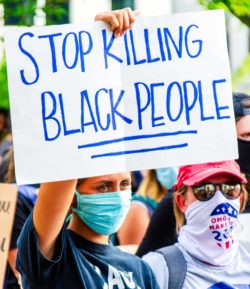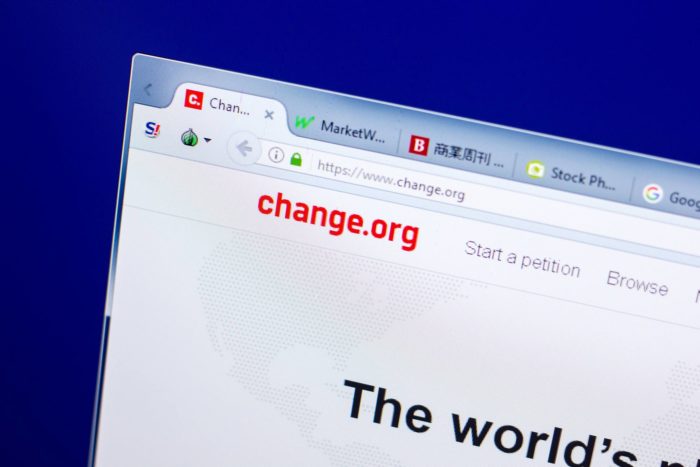Top Class Actions’s website and social media posts use affiliate links. If you make a purchase using such links, we may receive a commission, but it will not result in any additional charges to you. Please review our Affiliate Link Disclosure for more information.
UPDATE: On Nov. 24, 2020, a federal judge is considering a motion filed by Change.org to dismiss a class action lawsuit accusing the site of collecting and misusing millions of dollars intended to help seek racial justice for George Floyd.
A new class action lawsuit claims petition website Change.org has collected millions of dollars meant to help seek justice for a Minnesota man killed by police, but has not used the money as promised.
Plaintiff Sean. D. Randall is one of 17 million people who have signed a petition on Change.org seeking justice for George Floyd. Many Floyd petitions exist on the site, but the one signed by Randall and started by user Kellen S. is the most-signed petition in the site’s history, according to the complaint.
Randall signed the petition June 6. When he did so, he says, the next screen asked him if he could “chip in $3 or more” to keep the Floyd petition on the agenda and said millions of other users had already donated to the petition. Randall decided to donate $3.
The Change.org class action lawsuit says the donation screen made specific promises regarding what would be done with the money.
Allegedly, the screen told users “[c]hipping in allows Change.org to put the petitions on billboards across country [sic], blanket social media with calls to join, and email the petition to millions of people.”
However, Randall says there is no evidence Change.org has spent the millions of dollars collected with this Floyd petition on these “specific undertakings.”
The Change.org class action lawsuit notes a Business Insider article that indicates most of the money is spent to circulate the Floyd petition on Change.org’s own website or for overhead, with the rest becoming profit.
Change.org has since removed the donate button from the Floyd petition Randall signed, “after several users realized that the donations were not going to Mr. Floyd’s family, the Black Lives Matter movement, or even the purposes that Defendant indicated on the donation screen.”
More than 50 former Change.org employees wrote an open letter to CEO Ben Rattray, acting CEO Nick Allardice and lead investor Reid Hoffman, demanding the site disclose how much money it had raised through the petition and to donate that money to Floyd’s family, Black Lives Matter or related charities, Randall’s lawsuit says.

“Since Change.org is a for-profit corporation which depends on collecting new email addresses to make money, these actions constitute Change.org profiting from the death of Black people,” the letter continues. “We understand that’s a serious statement to levy, and we don’t take it lightly.”
The letter also calls for Change.org to allow “all future petition starters the option to exclude their petition from generating revenue for the company.”
Several class action lawsuits have been filed across the country related to the George Floyd protests and Black Lives Matter movement.
A group of protesters along with Black Lives Matter D.C. and the Washington Lawyers’ Committee for Civil Rights & Urban Affairs have filed a class action lawsuit naming President Donald Trump and other government officials after Trump allegedly ordered violent acts against peaceful Black Lives Matter demonstrators.
Black Lives Matter Los Angeles filed a class action lawsuit following the arrest of protesters during peaceful protests over police brutality. That class action lawsuit alleges the Los Angeles Police Department has arrested more than 2,600 peaceful protesters, violating their rights.
And in Seattle, Black Lives Matter and several citizens have launched a class action lawsuit accusing the city of unnecessary police brutality during recent peaceful protests.
Randall’s complaint alleges the plaintiff created a valid contract with Change.org when he donated money to the “Justice for George Floyd” petition, and that Change.org violated that contract by failing to use the money as promised.
Randall is seeking a jury trial and award of monetary damages to himself and all Class Members.
The Change.org class action lawsuit also asks for a ruling by the Court that Change.org has broken the law. In addition, the plaintiff is seeking an order for an accounting of how the site uses its donations and an injunction requiring Change.org to be transparent in the future about its use of donations.
Have you donated to a Change.org cause and suspect your donation was not used as promised? Tell us about it in the comments.
The plaintiff is represented by Robert B. Salgado, Dargan Ware, John E. Norris and Andrew Wheeler-Berliner of Davis & Norris LLP.
The Justice for George Floyd Change.org Class Action Lawsuit is Sean D. Randall v. Change.org, Case No. 3:20-cv-03863, in the U.S. District Court for the Northern District of California.
Read More Lawsuit & Settlement News:
Black Lives Matter Lawsuit Says Seattle Police Violent During Protests
Contaminated Juul Pods Pose Serious Risk to Users
Black Lives Matter Files Lawsuit Alleging Police Brutality At Peaceful Protest
Roundup Settlement Will Resolve Thousands of Claims Against Bayer
ATTORNEY ADVERTISING
Top Class Actions is a Proud Member of the American Bar Association
LEGAL INFORMATION IS NOT LEGAL ADVICE
Top Class Actions Legal Statement
©2008 – 2024 Top Class Actions® LLC
Various Trademarks held by their respective owners
This website is not intended for viewing or usage by European Union citizens.
















3 thoughts onChange.org Class Action Says Donations Don’t Go to George Floyd’s Family
I just wanted to say something about this. I think that it’s a real shame that good people have or are signing this petition and donate money are being duped.
The person (s) who started the petition did it for a good cause.
I hope that people who donated get their money back or at least the settlement money should go to the family members of that man.
Sorry again but I just wanted to voice my opinion.
Hi! My name is Allison Mitchell and I was the creator of one of the viral petitions on Change.org to remove Cuties from Netflix and have them face charges for Distribution of inappropriate sexual material involving a child. My petition had over 750,000 signatures before the company deleted the petition! Not only did they pocket the donations that were given to circulate the petition, they censored my right to petition because they are in bed with the deep state. I would love for someone to reach out top me and inform me if I have a case worth pursuing! My petition was on headlining news channels and websites and went viral and i’m upset that it was removed after a month of hard work on my part.
Misleading appeal for money. I signed a petition for a friend through Change.org and right after a request to give $11 or more popped up. I thought the money was going to help my friend, so I gave $100. That money actually went to “promote” her petition. I would never have sent $100 for that. I can’t afford that kind of wasteful spending. They send me a screenshot of the fine print highlighted in yellow, basically saying I should have read it. Very misleading. They are refusing to give me my money back.